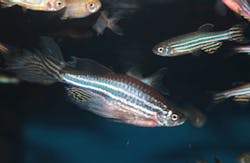Diabetes drug metformin linked to intersex development in fish
Traces of a diabetes drug in treated wastewater may be causing hormonal changes in freshwater fish, resulting in male fish that produce eggs.
A study by Rebecca Klaper at the University of Wisconsin-Milwaukee (UWM) showed that physical changes occurred in male fish exposed to the diabetes medicine metformin in doses similar to the amount seen in wastewater effluent. In addition to intersex fish, Klaper also observed a reduction in fertility and in overall size of male fish among those exposed to metformin.
Intersex fish are known to be particularly prevalent downstream from wastewater treatment plants, and previous studies have investigated the effect of hormones from birth control pills. By contrast, metformin targets blood sugar regulation and is not a hormone.
But Klaper, a professor in UWM's School of Freshwater Sciences, said that the drug is also prescribed to women with a common hormonal condition called polycystic ovary syndrome. Research in her lab indicates that metformin could be another potential endocrine disruptor — a chemical that confuses the body's hormonal messaging system, interrupting a range of normal activities, including reproduction.
Klaper and co-author Nicholas Niemuth point out that endocrine disruption is not solely predictable based on hormone receptor interactions. Many other non-hormone pharmaceuticals are found in effluent at concentrations orders of magnitude higher than estrogens, they explain in an article published in the journal Chemosphere.
Of the chemicals detected by Klaper in water samples collected from Lake Michigan, metformin stands out.
"It is the chemical we found in almost every sample and in the highest concentrations compared to other emerging contaminants — even higher than caffeine," the professor said.
